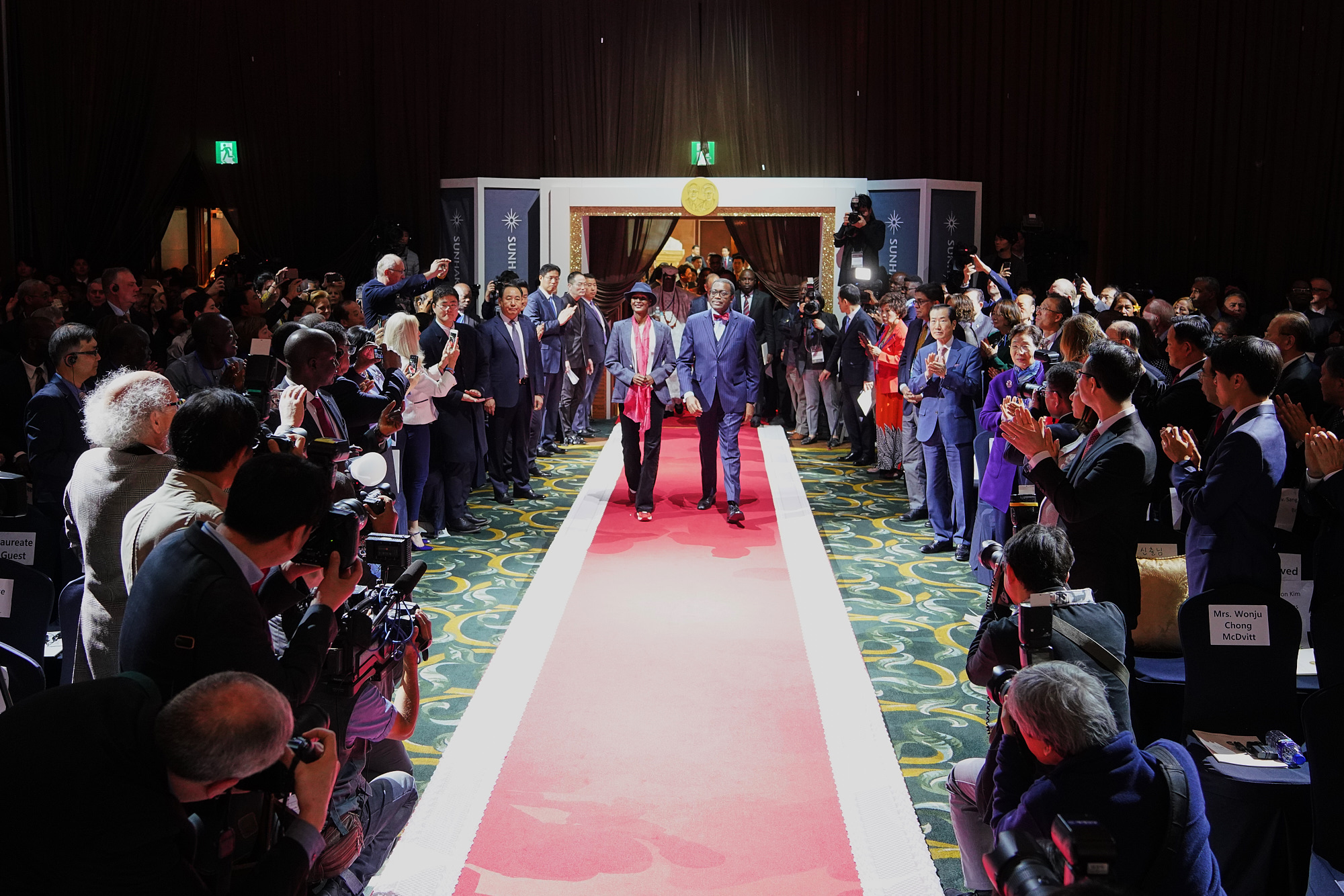![[Waris Dirie] 이미지](http://sunhakpeaceprize.org/data/bbsData/16142480339.jpg)
2019 Laureate
- Waris Dirie
- Supermodel and women’s rights activist
Waris Dirie is a pioneering human rights activist who fought for the eradication of female genital mutilation (FGM).
She was the first person to publicize to the world the violence of FGM. By raising the issue of FGM as an international human rights agenda, she contributed greatly to passing a resolution to ban its practice.

Leading the Campaign to Eradicate FGM by Raising Worldwide Awareness of
FGM as a Violence and Human Rights Issue
Waris Dirie is a
human rights activist who fought for the eradication of FGM. As the first
person to draw the world’s
attention to the violence of FGM, which causes extreme pain and can also lead
to death, she raised it as a human rights issue and has been leading the anti-FGM
campaign to eradicate the cruel practice. Through her efforts, people around
the world have started to view FGM as a violent crime. The campaign saved
millions of girls who would have been at risk of the violent practice.
Born into a goat-herding nomad family in Somalia, she underwent female
circumcision at the age of 5. In 1997, when her fashion career as a world-class
supermodel was at its peak, she revealed her experience with FGM on behalf of hundreds
of millions of African women who had gone through similar procedures. This
brave start led her to become a human rights activist to end the violent
practice that is being carried out in Africa. She was appointed as the first
Special Ambassador of the United Nations for the Elimination of Female Genital
Mutilation in 1997, and has been investing tireless efforts into anti-FGM campaign.
As a result of her efforts, 15 African Union member countries ratified the
Maputo Protocol, in which Article 5 lists FGM as a harmful practice that must
be ended. In 2012, the United Nations General Assembly unanimously passed a
resolution banning the practice and set a goal to eliminate FGM by 2030. This
milestone became a turning point that saved the lives of millions of girls who
were potentially at risk of the violent practice.
Female genital mutilation, or female circumcision, is carried out as a ritual in
some parts of Africa and others. During the process, the external female
genitalia are cut or removed, and the operated area is sewn together leaving a
tiny hole. Although this ritual has been practiced for over 3,000 years, it
does not have any medical benefits. This cruel practice, which is a crime in
many countries, is inhumane and often causes infertility, problems with
urination, high blood loss, infections and in some cases even death.
According to the World Health Organization (WHO), over 200 million girls and
women have been affected by FGM, which is prevalent in more than 30 countries,
including parts of Africa and the Middle East. About 3.5 million girls and
women annually and about 9,800 girls and women’s lives daily
are threatened by the brutal practice. Recently, due to increases immigration, FGM
is also being carried out in countries in Europe, North America and Asia.
In 2002, Waris Dirie established the Desert Flower Foundation, named after the
English translation of her first name, to actively promote the eradication of
FGM around the world. Her first book, Desert Flower, published in
1997, contains her life story including her experience with FGM. It has been
translated into many languages and has sold over 13 million copies around the
world. A major featured film based on her book was released in 2009 under the
same title, Desert Flower. It has been shown in 40 [이1] countries around the world further raising
the awareness around FGM and changing people’s perspective around FGM. The film
has also been shown by international NGOs including UNHCR and UNICEF.
Al Jazeera, the largest broadcasting company in the Arab world, invited Waris
Dirie to be interviewed on journalist Riz Khan’s program—the first TV program
in the Arab world to touch on the issue of FGM. In the interview, Dirie discussed
the dangers of FGM and asked everyone to help eradicate the practice. The
interview was viewed by 200 million people and created the opening for FGM to
be discussed publicly as a human rights issue in the Arab world. Waris Dirie
states, “Communities need to be educated in the fact
that FGM is not prescribed by any religion and it is not part of a culture.” There was a time when her bold statements and actions led to her
receiving threats. However, she has continued to lead the campaign to eradicate
FGM even at the risk of her life.
Because of her achievements, she received the Oscar Romero Award presented by
the Catholic Men’s Movement in 2007, and the Legion of
Honor award from the French government.
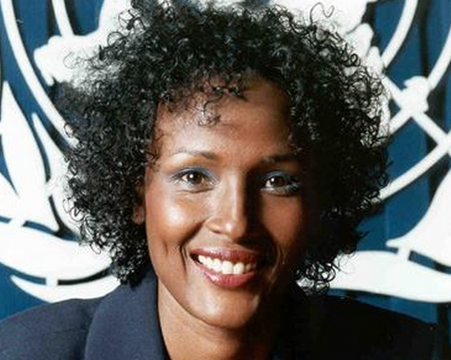
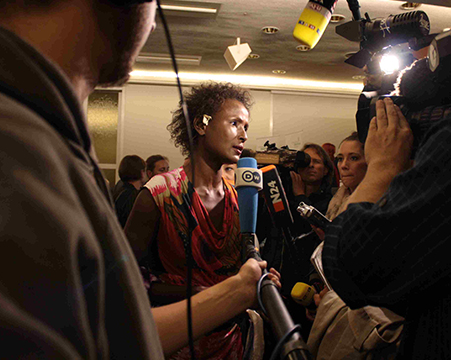
Healing the Souls and Bodies of FGM Victims through Reconstructive Surgery
Waris Dirie is also
leading efforts to provide reconstructive surgery and comprehensive care for
victims of FGM, who are physically and psychologically affected by the brutal
practice. In 2013, the Desert Flower Foundation partnered with the Waldfriede
Hospital in Berlin to open the first Desert Flower Center, which provides
comprehensive treatments for victims of FGM. Currently, these centers operate
in Paris, Berlin, Stockholm and Amsterdam with a medical team of 120 doctors,
nurses and staff. The centers provide physiological support, reconstructive
surgeries, vocational training, and educational programs.
FGM usually is done at home without any medical device. When a girl or a woman goes
through the procedure, there is a high chance of developing obstetric fistula,
an abnormal opening between the genital and urinary tracts. Girls and women who
are affected by obstetric fistula can suffer from incontinence of urine or
feces, causing various infections, extreme menstrual cramps, obstructed labor, and
also infertility.
When Waris Dirie first opened the Desert Flower Reconstructive Centers, her
goal was to provide educational materials for civil society groups and academic
institutions to prepare as many doctors as possible to perform reconstructive
surgery. The centers have provided education on FGM reconstructive surgery to
doctors and obstetricians. So far, medical teams from France, Austria, Belgium,
Brazil, Egypt, Ethiopia, Germany, Italy, Morocco, Sierra Leone and the United
Kingdom have participated in the education and have performed the
reconstructive surgery on FGM victims in their own countries.
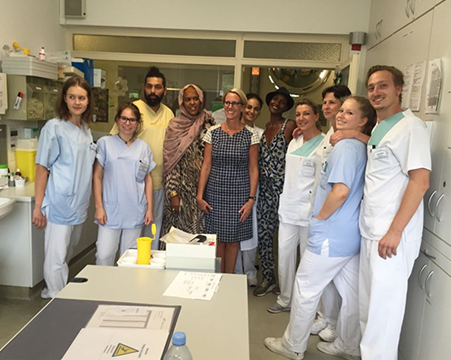
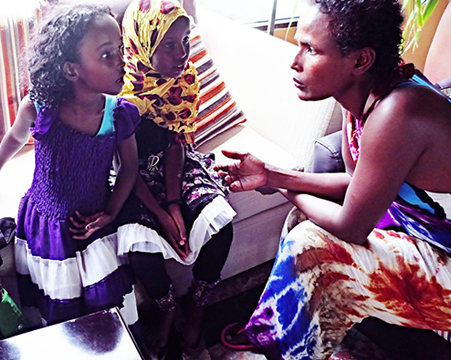
Providing Fundamental Solutions for the Eradication of FGM through
Education and Financial Support
Although many
countries have enacted laws to ban FGM after the United Nations General
Assembly unanimously passed a resolution banning the practice, FGM is still
being done around the world. Waris Dirie recognized that the practice is still being
carried out for financial benefit of the families from selling their daughters
for a high bride price and not because of tradition or culture. Therefore, as a
fundamental solution to the issue, Dirie devoted her efforts to helping victims
to stand independently by providing basic literacy education and vocational
education.
The Desert Flower Foundation runs a sponsorship program called Save a Little
Desert Flower, which protects girls in Sierra Leone and Djibouti from FGM and
provides financial sponsorship for the girls to attend school. Also, Waris Dirie
started a program called Education Initiative to lower the child illiteracy
rate. In 2018, she started building an elementary school in Sierra Leone to
raise children’s basic literacy. In
addition, she started a pilot project in many parts of Africa called Together
for African Women to provide women’s education, vocational
training and guaranteed income. She is also working on a project with
fair-trade companies in Ethiopia and Kenya that produce scarves and other
fair-trade products providing employment to thousands.
Waris Dirie states, “My goal is to help the women of
Africa. I want to see them get stronger, not weaker, and the practice of FGM
simply weakens them physically and emotionally. Since women are the backbone of
Africa, and they do most of the work, I like to imagine how much they could
accomplish if they weren’t butchered as children and
left to function maimed for the rest of their lives.”
Waris Dirie is calling out passionately that eradicating FGM can empower and
expand the rights of women and transform Africa.
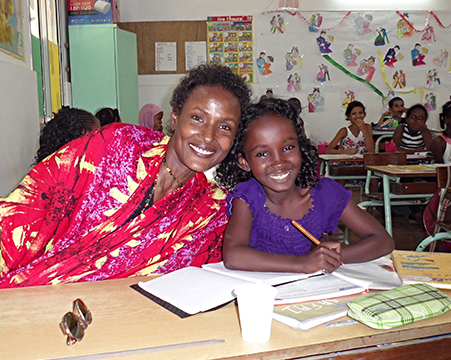
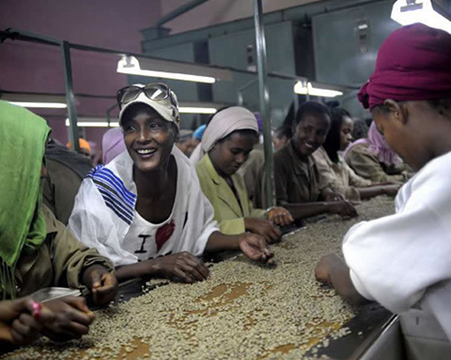
![[Waris Dirie] 이미지](http://sunhakpeaceprize.org/data/bbsData/16142480339.jpg)
Waris Dirie
- Born
- 1965
- Country
- Somalia
- Awarded for
- Publicizing the issue of Female Genital Mutilation (FGM) to the world;
Advocating for the human rights of girls and women and calling for a worldwide resolution to eradicate FGM
Professional Background
Top model, actress, activist and writer
1997-2003 UN special ambassador against female genital mutilation
2002 Founded Desert Flower Foundation
Films and Books
• 1987 Played Bond girl in the film The Living Daylights.
• 1997 Wrote the book Desert Flower (Her name, “Waris,” means “desert flower” in Somali). It has been published in 65 languages & sold more than 13 million copies around the world.
• 2001 Wrote the book Desert Dawn.
• 2005 Wrote the book Desert Children.
• 2007 Wrote the book Letter to My Mother.
• 2009 Co-produced the film Desert Flower, based on her book of the same name (Produced by Oscar Nominee Peter Hermann).
• 2010 Wrote the book Schwarze Frau, Weißes Land.
• 2013 Wrote the book Saving Safa: Rescuing a Little Girl from FGM.
• 2017 Wrote the book My Africa-The Journey (For Children)
Awards
• 1999 German Africa Award (Federal Republic of Germany)
• 2000 Woman of the Year Award (Glamour Magazine)
• 2002 Corine Literature Prize (German Book Trade)
• 2004 Women’s World Award (Mikhail Gorbachev)
• 2005 Bishop Oscar Romero Award (Catholic Church)
• 2007 Legion of Honor (France)
• 2007 Prix des Générations (World Demographic Association)
• 2008 Martin Buber Gold Medal (Euriade Foundation)
• 2010 Gold Medal of the President of the Republic of Italy (Contribution to human rights activism)
• 2013 Woman of the Year for “Campaign work” (Woman of the Year Foundation)
• 2017 Woman of the Year for “Women for Women” (Gala Magazine)
• 2018 Woman of the Year (Valle d'Aosta Regional Council, Italy)
Commemorative Books
Protector of Women’s Rights ‘Waris Dirie’
- Planning & Editing
- Sunhak Peace Prize Secretariat
- Publishing House
- SOMENSUM
- Issued
- Febryary 25th 2020
-
- Table of Contents
-
Part 1. In The Desert
Part 2. Going To London
Part 3. New World
Part 4. New Challenge





